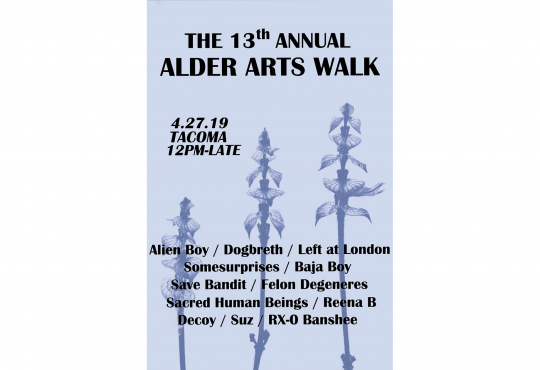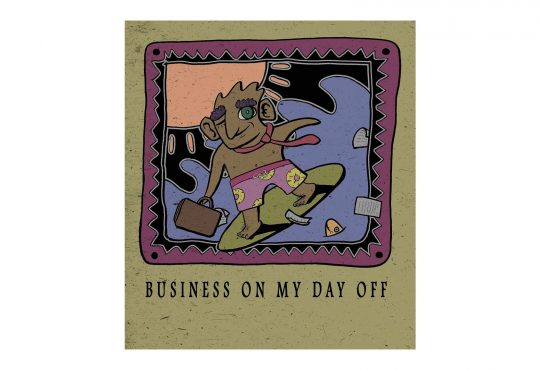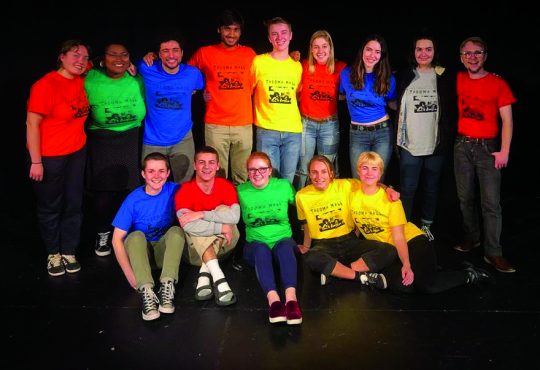ORANGE YOU GLAD I DIDN’T SAY DEPRESSION? Special guest column from Combat Zone writer Michelle Loserby
by Michelle Leatherby
On September 29, 2001, “Saturday Night Live” recorded the first episode of the 27th season of the show. The episode began with New York’s mayor at the time, Rudy Giuliani, delivering a heartfelt speech about the 9/11 attacks on New York just a couple weeks earlier. After a tribute to the lives lost, “Saturday Night Live” producer Lorne Michaels joined the mayor on stage asking, in light of recent events, “Can we be funny?” Mayor Giuliani responded with “Why start now?” followed by the famous words uttered by many before and many to come, “Live from New York, it’s Saturday Night!”
I was eight years old when I watched this episode, and, subsequently, eight years old when I learned what I wanted to do with my life—write comedy. I’d learned at a young age that I was able to make people feel things from the things I’d created, and my favorite thing to make people feel was better.
It’s a sweet thought and a touching anecdote—me wanting to be a comedian in order to administer a panacea for sadness. But that perception of a comedian’s role in society is harmful.
Comedy is not an equation. Darkness divided by humor does not equal happiness.
“There’s a very dark side to the minds of many comedians. Humor is often born of defense, wit is often born of anger. For some, the mind is in a constant state of restlessness; ceaselessly racing and rarely finding peace. Like all other art forms, comedy is inspired in equal parts by joy and by pain. It’s so important that we imagine each other complexly, and never assume that the outward reflects the inward.”
This post was written by my friend and fellow comedian, Ben Auxier, on Aug. 11 in response to the news of Robin Williams’ death.
At the time, I had been hired to write for a live sketch comedy show that Ben was producing in Kansas City. I was hired amidst one of my most serious bouts of depression and harmful thoughts.
My counselor at the time quite literally told me, “I just can’t imagine you being funny. You have such a somber demeanor.” It wasn’t until I did an impression of someone telling me I could get rid of my depression if I just prayed hard enough that she understood. And that was the issue—I was serious in my counselor’s office one hour a week and attempting to be funny everywhere else.
With the cast of comedians for the show in Kansas City, I learned that comedy is nearly perpetually suspended in a dichotomy between darkness and light. As such, many comedians have difficulty garnering support for their well-being.
As comedians, we learned young that we could use humor to alleviate tension and create a facade for unpleasant emotions. The people around us don’t understand how to respond when we deviate from our joking demeanor, which often forces us to operate in this joking public face on a near-constant basis. This can lead to a very dangerous mental place for comedians.
This fits into a broader conversation urging for the de-stigmatization of mental health issues, which is the precise reason I write this piece.
I typically write for the Combat Zone with the pseudonym Michelle Loserby, a name that I have re-appropriated from my elementary school bully. But I write this piece as Michelle Leatherby: honors student with a learning disability, comedian with depression and anxiety and terrible dancer with an excellent sense of rhythm.
We can better understand the minds of others if we first look at the polarizing labels that attempt to confound our own identities. Do your world a favor and hug a comedian today.



